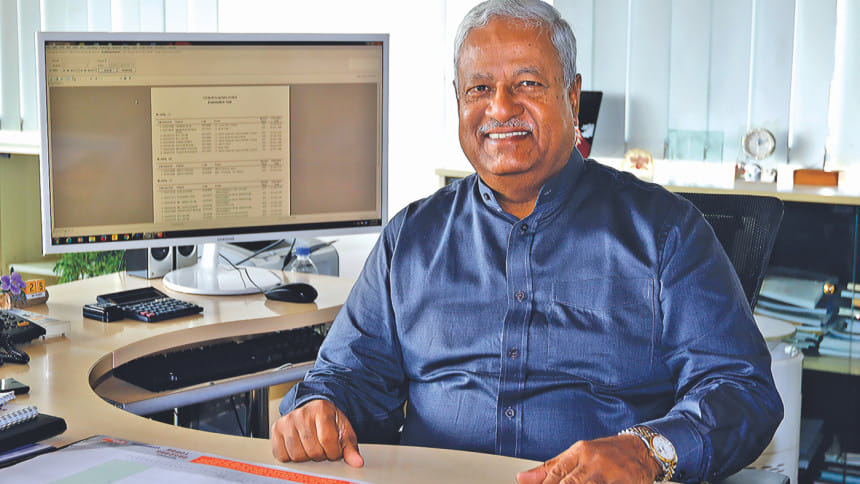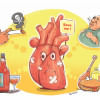“A comprehensive plan is needed to address country’s cardiac disease issues”

How would you analyse the current situation of cardiovascular diseases in Bangladesh?
Bangladesh is a populous country and among the existing non-communicable diseases, cardiovascular disease remains to be one of the major killers. As you know, we are already struggling with people's confidence in the healthcare system. This is a serious problem and we need to address this very carefully. We have to do visible work because people know the standard of services overseas and we need to provide international quality services in order to retain the faith of people in our treatment facilities. A comprehensive plan is needed to address cardiovascular disease; we cannot address it with a piecemeal approach.
It is surprising that in Bangladesh we don't have that many comprehensive centres for addressing cardiac issues. Management for cardiovascular disease comprises of two major wings; cardiac surgery and cardiology which includes cardiac interventions such as angiogram, angioplasty, etc. Cardiac problems i.e. chest pain, heart attack, etc. need to be addressed on an emergency basis in most of the cases, whereas cardiac surgery is usually elective which means that when heart problems get diagnosed, there is some time in hand to plan for surgery. At United Hospital, we have both cardiac surgery and cardiology departments.
In Dhaka, we have around 30 centres which provide cardiac services but unfortunately out of these, only five or six centres provide complete comprehensive services. The full range of comprehensive services includes cardiac catheterisation to do angiograms, angioplasty, etc., followed by cardiac surgery for bypass graft, valve replacements and so forth. Altogether, there are only 45 cath labs in Bangladesh which is a negligible number compared to our huge population.
Emergency is a part of cardiac treatment and one needs to be ready 24/7 with the proper team, right resources and infrastructure to be able to treat patients properly. But in our country, this need gets ignored in most of the cases. There are very few centres in Bangladesh with trained manpower, which can pinpoint the required treatment at the right time and provide it to patients with heart diseases.
What are the facilities for cardiac treatment your hospital is offering?
United Group entered the healthcare sector 13 years back, with United Hospital having full-fledged cardiac care services. We brought two special cardiac ambulances from Australia which had mobile critical care beds fully loaded with required facilities, set up three modular cardiac operation theatres (OTs) and two cath labs. Gradually, we added more infrastructures and currently we have three cath labs among which one is country's lone iGs 520 cath lab. We also have four running cardiac OTs which most hospitals don't have. Our cardiac surgery team is doing more than 100 cardiac surgeries per month with full satisfaction of the patients, as per their feedback.
We have around 100 critical care beds, fully equipped with state-of-the-art ventilators and medical gas systems, to handle cardiac patients with renal failure and other co-morbidities. Our critical area beds are individually controlled by monitors and centrally controlled by another monitor to minimise any oversight in patient care. Moreover, we practice Code Blue, which is a Cardiac Emergency Code as per International Protocol, to address cardiac emergency patients with a dedicated team.
We have Exercise Tolerance Test (ETT) which can determine one's heart condition while running on a treadmill. This is a gold standard. Those who cannot perform ETT due to old age, undertake Myocardial Perfusion Imaging (MPI) Test. Through this test, our nuclear medicine department can detect the pumping ability of a patient's heart muscles. Some patients have renal insufficiency due to which they cannot do CT angiogram; our 3.0 Tesla MRI machine has Cardiac MRI facility which is safe for such patients. These unique supports under one roof are available in United Hospital.
How can we raise awareness about heart disease risks and its prevention? What role is your hospital playing in this regard?
Currently, heart disease is increasing significantly due to which people are automatically becoming aware, as almost everyone has near and dear ones suffering from it.
Rapid urbanisation, lifestyle and food habits are three main reasons behind the increasing rate of heart disease in Bangladesh. Family history too plays a big role, though we don't have much control over it. Moreover, people who are diagnosed with other diseases such as diabetes and hypertension also have increased risks of developing heart disease.
We are currently observing rising number of newborn babies with congenital heart defects. Exposures to various risk factors during pregnancy, including lack of physical activity are deemed to be the major causes behind. Therefore, we need to raise awareness at all levels in this regard.
We conduct continued medical education (CME) programmes by bringing doctors from overseas to train our doctors. We also do Live Transmission of cases from our cath labs to share with doctors abroad as in Japan, Europe as well as across many centres of Bangladesh. Our Nursing College has government permission to conduct special post-graduate Cardiac Nursing course to train 20 nurses every year, where nurses from any hospital of the country can participate.
Most of the educated people also don't go for regular health check-up unless they have any physical discomfort. Awareness can be increased if people go for regular screening based on risk factors. People aged 20 and above can obtain regular screening at least once a year.
We also do community engagement programmes with corporate clients where we talk about proper lifestyle management. Besides, we host patient forum where patients can share their experiences.
People have a perception that private hospitals are expensive and cardiac treatment is more so. What is your opinion on that?
Getting right healthcare is always expensive, anywhere in the world. It's very unfortunate that in Bangladesh, everyone has to pay money out of their own pocket for medical treatment as we don't have medical insurance facility. In other countries, the medical expenses are paid by the state or by insurance companies and also through charities. We too need such alternative options because the cost of proper medical treatment – human resources, machineries, technologies, training facilities, infection control – are always going to be high. For example, in India there are charities run by movie stars; patients are given slips through these charities and they can then obtain free treatment. Whereas, in Bangladesh, there is no alternative funding option in case someone becomes unable to bear the expenses after a certain point of time.
For those who go abroad for treatment, despite the monetary, physical and mental cost, it gets very difficult for the persons accompanying the patients to move, because one doesn't know what may happen to the patient in a matter of minutes or seconds. Moreover these days, India, which is the chosen overseas country by our patients in more than 90 percent cases, has a lot of patients from its own soil; hence it is even getting difficult for them to cater to cardiac patients from other countries.
What is United Hospital's future plan?
We want to establish minimally invasive cardiac surgery and want to start robotic heart surgery. We also want to start Heart Transplant surgery in our Cardiac Surgery Centre. To start Heart Transplant facility, we would need government support because transparent and simplified laws are required in case of organ transplant. Recently, we collaborated with Medtronic and have started a Heart Failure clinic, which is the first of its kind in the country. As our average life expectancy is increasing, the number of patients with heart failure is also increasing in our country. Our efforts are directed to increase their survival age with a better quality of life. We make phone calls to these patients to check on their health status every two weeks; we also counsel their family members.
We consider ourselves a serious and sincere operator in the country's healthcare sector, with a keen intention for continuous learning to acquire better service from abroad to continuously upgrade ourselves with a view to deliver world class healthcare benefits to our country's population.
The interview was taken by Maisha Zaman of The Daily Star.

 For all latest news, follow The Daily Star's Google News channel.
For all latest news, follow The Daily Star's Google News channel. 






Comments